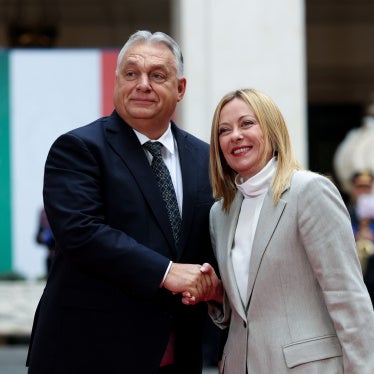The furore over the death in prison of Slobodan Milosevic weeks before he was due to be sentenced should not obscure the debate about how criminals of the Balkans Wars are to be brought to justice. There is a huge 'impunity gap'.
The mission of the International Criminal Tribunal for the former Yugoslavia (ICTY) was always understood to be limited, mainly to arraigning those who gave the orders. It is in any event due to be wound up by 2010.
If those who actually pulled the triggers are to face justice as well, then it is essential that there are also effective domestic prosecutions in the states of the ICTY.
To that end, several current and potential donor states are meeting in Brussels next week (March 31) to discuss funding for the newly established War Crimes Chamber in Bosnia and Herzegovina.
Recognising the magnitude of the crimes committed in former Yugoslavia, the worst in Europe since the Second World War, the EU has been crucial to the success of the ICTY.
It now has a crucial role in ensuring that this promising but fragile new judicial institution is not left to flounder.
A joint initiative of the Hague Tribunal and the Office of the High Representative in Bosnia, the Sarajevo Chamber, began operations early last year.
Its mandate is in part to bring to justice those who committed serious war crimes which could not be prosecuted within the ICTY mandate or time-frame. Though it is temporarily relying on a complement of international staff, the chamber operates under national law as part of Bosnia's state court.
The ICTY has already transferred two of its cases, with additional transfers expected. But the Chamber's mandate extends well beyond handling ICTY cases; it will also try war crimes cases initiated by the Bosnian authorities. Last December, for example, it issued an indictment in relation to the Srebrenica massacre, with 11 suspects charged with involvement in the capture, detention, and summary execution of thousands of Bosnian Muslim men and boys. There are high expectations that the chamber will deliver justice for the heinous crimes committed in Bosnia.
But continued EU support - and where necessary political pressure - is needed, for example to unblock the lack of co-operation from states in the region on extradition matters and to help resolve unsatisfactory provisions in Bosnian criminal law.
The chamber is also struggling to secure adequate funding. The figures are modest, just 6% of the running costs of the ICTY (€43 million through 2009, ie for three years).
Inadequate political and financial support could sabotage the investment already made, with serious implications for the people of the Balkans.
If the EU is serious about justice, it must extend its attention to domestic war crimes prosecution in the Balkans.







